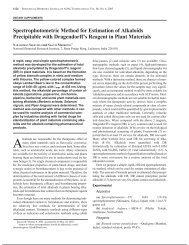- Page 2 and 3: JAPANESEFOR BEGINNERS
- Page 4 and 5: ABOUT TUTTLE“Books to Span the Ea
- Page 6 and 7: ContentsIntroductionAcknowledgments
- Page 8 and 9: “Is She Stubborn?” Asking Quest
- Page 10 and 11: Quick Reference: Verb TensesPractic
- Page 12 and 13: PracticeHolidaysRelationshipsChapte
- Page 14 and 15: PracticeHow to set up meeting place
- Page 16 and 17: IntroductionI have written this boo
- Page 18 and 19: AcknowledgmentsI am deeply grateful
- Page 20 and 21: time reviewing that chapter again.
- Page 22 and 23: Chapter 1Sounding Japanese First th
- Page 24 and 25: The Japanese Writing System (Script
- Page 28 and 29: Japanese words, remember, are prono
- Page 30 and 31: they indicate the topic (wa), subje
- Page 33 and 34: Chapter 2Wow!Express Your Emotions!
- Page 35 and 36: AraAreatashi noatashiboku nobokukei
- Page 37 and 38: following English expressions in bo
- Page 39 and 40: genki (na)healthy; fine; wellǍAh,
- Page 41 and 42: Anō is used to turn someone’s at
- Page 43 and 44: Chapter 4How Do You Do?Dialogue: Ha
- Page 45 and 46: Shaded items: Check the “Learning
- Page 47 and 48: M→OshiroJapanese family nameHisas
- Page 49 and 50: always occurs directly after nouns,
- Page 51 and 52: (cooked rice, meal) 9. _______sake(
- Page 53 and 54: Mr. Brown : Buraun Robāto desu. Ko
- Page 55 and 56: 1 Kora!Omaetachi soko de nani yatte
- Page 57 and 58: Learning from the Comic (page 27) U
- Page 59 and 60: 6. What could it be?_______________
- Page 61 and 62: Sumisu-san wa gakusei da.Ginkō ga
- Page 63 and 64: To make a question out of a present
- Page 65 and 66: Sumisu-san datta?Tōkyō datta?Okur
- Page 67 and 68: form:bird.”
- Page 69 and 70: chapter to learn more about these.V
- Page 71 and 72: 3. To ask a question. In the third
- Page 73 and 74: Issho ni ikō ze!MLet’s go togeth
- Page 75: 1. Women would say: That’s not my
- Page 79 and 80:
1. Adjectival nouns can be used as
- Page 81 and 82:
Fuben datta.Ganko datta.It was inco
- Page 83 and 84:
“You are not good atcooking.”__
- Page 85 and 86:
VocabularySee the “Learning from
- Page 87 and 88:
Learning from the DialoguesUSING SA
- Page 89 and 90:
Soko ni Sumisu-san ga iru?Nani o ya
- Page 91 and 92:
sentence is quite often used by wom
- Page 94 and 95:
Chapter 10Girls’ TalkDialogue: On
- Page 96 and 97:
See the “Learning from the Dialog
- Page 98 and 99:
Learning from the DialogueUSING ...
- Page 100 and 101:
Kimi datte hen da zo.MBoku no Nihon
- Page 102 and 103:
not like mentioning things clearly
- Page 104 and 105:
TRANSLATIONS (from comic on page 63
- Page 106 and 107:
A-M : Kanojo samuku nai kana. (I wo
- Page 108:
____________________6. Ara, okurimo
- Page 111 and 112:
A Few Things to Know about Adjectiv
- Page 113 and 114:
form nai. (You’ll learn more abou
- Page 115 and 116:
PracticeAffirmative Negative Affirm
- Page 117 and 118:
Chapter 13How Funny Is It? More Des
- Page 120 and 121:
VocabularySee the “Learning from
- Page 122 and 123:
USING KKEThe particle kke used at t
- Page 124 and 125:
Dare ga iku?Itsu ga ii?Who will go?
- Page 126 and 127:
Now let’s practice using ... n da
- Page 128:
5. M : Ano otoko no hito o shitte i
- Page 132 and 133:
OkāsanTen’inOkāsanTen’inMusum
- Page 134 and 135:
mōshiwake arimasenmōshiwakesorede
- Page 136 and 137:
same function as the word koto that
- Page 138 and 139:
Dragon BoatsHārii (also known as H
- Page 140:
Chapter 15I Need to Diet!ダイエ
- Page 143 and 144:
you?Sō kanā!You think so!2 Sono n
- Page 145 and 146:
ga, ano shiroi_____________________
- Page 147 and 148:
How to Change the Dictionary Form i
- Page 149 and 150:
yobu (to call) + nai → yobanainom
- Page 151 and 152:
miru (to see) + te→miteExceptions
- Page 153 and 154:
RULE 6For verbs ending in a diphtho
- Page 155 and 156:
Chapter 17Do You Work? More about V
- Page 158 and 159:
“Do You Work?” Asking Questions
- Page 160 and 161:
Un, hataraita.Un, oyoida.Un, shita.
- Page 163 and 164:
Can You Speak English? MoreQuestion
- Page 165 and 166:
USING THE SUFFIX -ENThe -en as in d
- Page 167 and 168:
→kiru (to cut) → kireruhairu (t
- Page 171 and 172:
Chapter 19Show Me, Please: More abo
- Page 173 and 174:
SENTENCES ENDING IN KAMO SHIRENAI K
- Page 175 and 176:
USING TE FORM OF A VERB + IRUThe Te
- Page 177:
by making them different shapes and
- Page 180 and 181:
(Yes, they’re asleep. So, who is
- Page 182 and 183:
nakamafriend, fellow, companionshir
- Page 184 and 185:
Mō ichido sagashite miru.Chotto da
- Page 186 and 187:
USING A QUESTION AS AN INVITATIONAs
- Page 188:
Listen to the conversation on the C
- Page 191 and 192:
TRANSLATIONS1 Tenki warui nā!2 Zan
- Page 194 and 195:
Chapter 22Good, Better, Best: Makin
- Page 196 and 197:
dotchikotchi~no hō gahōyōshokuto
- Page 198 and 199:
by no.Neru hō ga taberu yori suki.
- Page 200 and 201:
beans)
- Page 202 and 203:
dore?dore?Watashi wa itsumo Boku wa
- Page 204 and 205:
said when replying to a question. A
- Page 206 and 207:
Along with the name of the main ite
- Page 208 and 209:
Tsuma : Kono isu sukoshi hikui ne.
- Page 210 and 211:
VocabularySee the “Learning from
- Page 212 and 213:
Koko de omachi ni narimasu ka?Dōzo
- Page 214 and 215:
1. chigau (to differ) + masu → __
- Page 216 and 217:
hayai (quick)→ hayasa (quickness)
- Page 218:
Hikizan (subtraction) 10 - 7 = 3 J
- Page 221 and 222:
TRANSLATIONS1 Nani kangaeteru n da?
- Page 223 and 224:
Start with the dictionary form of t
- Page 225 and 226:
imperative forms. Write the answers
- Page 228 and 229:
Short Dialogues: What Will You Give
- Page 230 and 231:
watch.Note: The particle ni in the
- Page 232 and 233:
The particle mo as in the above exa
- Page 234 and 235:
oneself—are still a very big elem
- Page 236:
Ja, watashi ga Ja, boku ga chūmon
- Page 239 and 240:
When you’re talking about somethi
- Page 241 and 242:
3. Chotto dake kodomo o mite 1 kure
- Page 243:
Here are some verbs and their oppos
- Page 247 and 248:
JoshiDanshiJoshiDanshiJoshiDanshiJo
- Page 249 and 250:
kyōjuprofessor; teacherkibishiistr
- Page 251 and 252:
(Where did you buy the shoes?)USING
- Page 253 and 254:
In the modifying part you’ve adde
- Page 255 and 256:
keizaigaku (economics)rekishi (hist
- Page 257:
What’s Up?どうしたんだ?Chap
- Page 260 and 261:
2 Shinrigaku totteru? Iya, naze?Shi
- Page 262 and 263:
4. Watashitachi wa sanji ni atta. S
- Page 265 and 266:
Short DialoguesFEMININE MASCULINE1.
- Page 267 and 268:
wa daijōbu “I’m all right” i
- Page 269 and 270:
In Japanese, a sentence in the pass
- Page 271 and 272:
subject of a conversation, so it al
- Page 273 and 274:
M : Kore shibaraku nitara, nanikaku
- Page 275:
Sore mada narattenai yo.Sore mada n
- Page 278 and 279:
tokiumidaibingumō (with negatives)
- Page 280 and 281:
Noni is located after the na that f
- Page 282 and 283:
From the box below, choose the appr
- Page 285 and 286:
Chapter 32Eisā FestivalDialogue: E
- Page 287 and 288:
See the “Learning from the Dialog
- Page 289 and 290:
-Kata can be used as a polite suffi
- Page 291 and 292:
EisāOkinawan : Did you hear the dr
- Page 294 and 295:
Chapter 33The Great Tug-of-War お
- Page 296 and 297:
people), yonin (four people), etc.5
- Page 298 and 299:
the sense of competition that the e
- Page 300 and 301:
MidoriMakiMidoriMaki(Midori? Are yo
- Page 302 and 303:
(There’s a party at Harajuku)Maki
- Page 304 and 305:
you are able to use casual speech.
- Page 306 and 307:
How to set up meeting places in Jap
- Page 308 and 309:
Jōji: Waseda daigaku de tomodachi
- Page 310 and 311:
VocabularytheseSee the “Learning
- Page 312 and 313:
can modify a noun with a verb, if i
- Page 314 and 315:
Appendix A NOUN + SURU REFERENCE No
- Page 316 and 317:
Appendix BTABLE OF VERB CONJUGATION
- Page 318 and 319:
kaesu (give back) kaeshimasu kaeshi
- Page 320 and 321:
narau (learn) naraimasu naratte nar
- Page 322 and 323:
todokeru todokemasu todokete todoke
- Page 324 and 325:
Exercise Answer Keys Chapter 1A. 1)
- Page 326 and 327:
Sono kuruma shinsha da zeTsukamaeta
- Page 328 and 329:
9. Yaseru koto/no wa kantan ja nai.
- Page 330 and 331:
3. homeru (to praise) + → homemas
- Page 332 and 333:
Chapter 30I 1. Gakusei no toki, bok
- Page 334 and 335:
JunIchirōJunIchirōJunIchirō: Kim
- Page 336 and 337:
dance dare who dareka anyone; someo
- Page 338 and 339:
of keredomo) keitai denwa cell phon
- Page 340 and 341:
pachinko Japanese pinball pan bread
- Page 342 and 343:
zaiko stock zaisan property zannen
- Page 344:
Te form of a verb + (mo) ii (158) P









